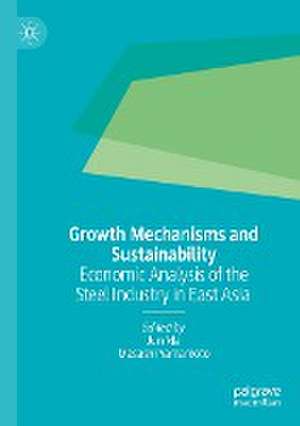Growth Mechanisms and Sustainability: Economic Analysis of the Steel Industry in East Asia
Editat de Jun Ma, Masashi Yamamotoen Limba Engleză Paperback – 18 iul 2022
| Toate formatele și edițiile | Preț | Express |
|---|---|---|
| Paperback (1) | 725.13 lei 6-8 săpt. | |
| Springer Nature Singapore – 18 iul 2022 | 725.13 lei 6-8 săpt. | |
| Hardback (1) | 730.35 lei 6-8 săpt. | |
| Springer Nature Singapore – 17 iul 2021 | 730.35 lei 6-8 săpt. |
Preț: 725.13 lei
Preț vechi: 884.30 lei
-18% Nou
Puncte Express: 1088
Preț estimativ în valută:
138.75€ • 145.26$ • 114.81£
138.75€ • 145.26$ • 114.81£
Carte tipărită la comandă
Livrare economică 05-19 aprilie
Preluare comenzi: 021 569.72.76
Specificații
ISBN-13: 9789811624889
ISBN-10: 9811624887
Ilustrații: XXVI, 283 p. 37 illus., 1 illus. in color.
Dimensiuni: 148 x 210 mm
Greutate: 0.37 kg
Ediția:1st ed. 2021
Editura: Springer Nature Singapore
Colecția Palgrave Macmillan
Locul publicării:Singapore, Singapore
ISBN-10: 9811624887
Ilustrații: XXVI, 283 p. 37 illus., 1 illus. in color.
Dimensiuni: 148 x 210 mm
Greutate: 0.37 kg
Ediția:1st ed. 2021
Editura: Springer Nature Singapore
Colecția Palgrave Macmillan
Locul publicării:Singapore, Singapore
Cuprins
Part 1. Growth and Changes in the Steel Industry.- Chapter 1. Changes in the Trade and Competition Environment and the Specialization Structure in East Asia.- Chapter 2. Changes in the Trade Structure of the Iron and Steel Industry in East Asia from the Perspective of the International Division of Labor.- Part 2. Technological Innovation in Steel Companies.- Chapter 3. Technology transfer management in the steel industry: focusing on transfer speed, recognition lag and learning lag.- Chapter 4. Innovation and Rise of the Japanese and Korean Steel Industries as Latecomers in the Global Steel Industry.- Part 3. Issues of Resources and Environment in the Steel Industry. - Chapter 5. Decomposing the Energy Impact of the Steel Industry in the Manufacturing Sector: Evidence from East Asian Countries.- Chapter 6. Climate Shocks and Raw Material Prices in the Steel Industry.- Part 4. Impacts and Challenges of the Growth in China’s Steel Industry.- Chapter 7. Impact of Imports, Technological Progress and Domestic Demand on the Growth and Structural Changes of China's Steel Industry: Evidence from trade relations in East Asia. - Chapter 8. The Policy and Effects of International Production Capacity Cooperation in China's Iron and Steel Industry.- Chapter 9. Labor Productivity and Surplus Labor of Chinese Firms in the Iron and Steel Industry.- Chapter 10. On the Electoral Consequences of Rising Chinese Imports: Evidence from Japanese Elections.- Chapter 11. Challenges and Policy Suggestions for Sustainable Growth.
Notă biografică
Jun Ma is an expert in the field of labor economics and industrial organization. He obtained his Ph.D. in economics from Kyoto University (Japan) in 1998. Since that year, he has been working at the University of Toyama, where he became a full professor in 2009.
Masashi Yamamoto earned his Ph.D. in economics from Keio University (Japan) in 2010. He is currently a professor of economics at Tokai University (Japan). Before joining Tokai University, he was a faculty member at University of Toyama from October 2008 to March 2021.
Masashi Yamamoto earned his Ph.D. in economics from Keio University (Japan) in 2010. He is currently a professor of economics at Tokai University (Japan). Before joining Tokai University, he was a faculty member at University of Toyama from October 2008 to March 2021.
Textul de pe ultima copertă
This book provides a broad investigation of various issues in East Asia’s steel industry since the 1980s, including international specialization and trade relations, the sustainable use of resources, technological innovations, and environmental mitigation, alongside a consideration of the rapid growth in Chinese steel industry. Using macro and firm-level data, and case studies based on field research to discuss issues concerning the steel industry in East Asia. In search of an easy understanding, we try to simplify complicated economic models and statistical analyses, and concentrate on policy implications based as much as possible on the results of empirical analyses. We believe that this book will be of interest to policymakers, economists, practitioners and advocates of sustainability.Jun Ma is an expert in the field of labor economics and industrial organization. He obtained his Ph.D. in economics from Kyoto University (Japan) in 1998. Since that year, he has been workingat the University of Toyama, where he became a full professor in 2009.
Masashi Yamamoto earned his Ph.D. in economics from Keio University (Japan) in 2010. He is currently a professor of economics at Tokai University (Japan). Before joining Tokai University, he was a faculty member at University of Toyama from October 2008 to March 2021.
Masashi Yamamoto earned his Ph.D. in economics from Keio University (Japan) in 2010. He is currently a professor of economics at Tokai University (Japan). Before joining Tokai University, he was a faculty member at University of Toyama from October 2008 to March 2021.
Caracteristici
Compares steel industries across three countries Offers empirical data about Chinese and East Asian steel production Explores how the pursuit of sustainability may transform the industry
